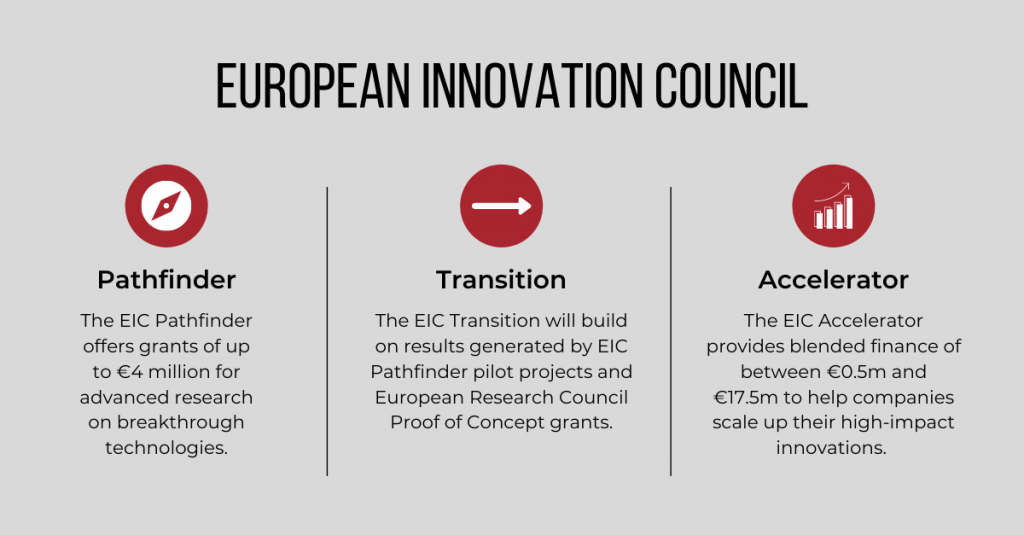The European Innovation Council is officially launched
The European Commission has officially launched the European Innovation Council under Horizon Europe, following a three-year pilot phase under Horizon 2020. The agency has a budget of €10 billion for 2021-2027 to develop and scaleup breakthrough innovations. This makes the EIC the most ambitious step the EU has ever taken in the field of innovation.
The agency will support the EU’s overall strategy in building back better from Covid-19. Areas of focus include digitalisation, as well as the green agenda, climate change and sustainability. In addition, the EIC seeks to overcome biases in innovation, including those against women and poorer regions of the EU. This is reflected in the new EIC Prizes.
The first annual work programme of the EIC is now available, making funding of over €1.5 billion available for 2021. You can find more information on each of the main calls below:
EIC Accelerator
Firstly, the EIC Accelerator has €1bn available to help start-ups and SMEs bring their innovations to market and scale up. Under Horizon Europe, the EIC Accelerator features a new, simplified application system. Start-ups and SMEs can submit a short application at any time.
It provides a unique combination of blended finance, with both equity and grant funding available*. Half of the available funding will support the Green Deal, digital technologies, and health innovation.
*Please note that UK entities are only eligible for the grant component.
EIC Pathfinder
Secondly, the EIC Pathfinder will fund advanced research on breakthrough technologies. Grants are available for consortia of at least 3 partners, each of which should be established in a different Member State (or Associated Country).
The programme has a budget of €300 million, with individual research teams eligible to apply for up to €4 million in grant funding. The majority of the programme’s budget will be allocated through open calls. However, €132 million will tackle five Pathfinder challenges: self-aware artificial intelligence, tools to measure brain activity, cell and gene therapy, green hydrogen, and engineered living materials.
EIC Transition
Thirdly, the EIC Transition aims to bridge the gap between research and innovation by increasing your project’s market and technology readiness. The first call will focus on promising results generated by EIC Pathfinder pilot projects and European Research Council Proof of Concept projects.
All projects funded by the European Innovation Council will also have access to Business Acceleration Services. This includes access to coaches, mentors and expertise, partnership opportunities with corporates and investors, and a range of services and events.
European Innovation Council Prizes
- EU Prize for Women Innovators
- European Capital of Innovation Awards (iCapital)
- European Social Innovation Competition
- The European Innovation Procurement Awards
The EU Prize for Women Innovators and the European Capital of Innovation Awards are now open for applications. The other EIC Prizes will open later this year.
How RedKnight can help
RedKnight aims to make innovation funding as simple as possible for tech-based startups and SMEs. Since our launch in 2015, we have secured over £9.9 million of grant funding! If you’d like to discuss a project with one of our advisers, please contact us to arrange a free consultation.
Eureka Clusters AI Call 2021: €30 million available
 The Eureka Clusters AI Call 2021 has €30 million available for innovative projects in artificial intelligence (AI). The competition aims to boost the productivity and competitiveness of European industries through the adoption and use of AI systems and services.
The Eureka Clusters AI Call 2021 has €30 million available for innovative projects in artificial intelligence (AI). The competition aims to boost the productivity and competitiveness of European industries through the adoption and use of AI systems and services.
This competition previously opened in 2020. Due to the interest that was shown, as well as the national priorities of participating countries, Eureka has decided to launch the call again. It hopes that by paving the way for transnational collaborative projects, the competition will stimulate activity in AI. This will support economic growth and benefit society as a whole.
Participating Countries
The following countries have allocated funds to support ground-breaking Artificial Intelligence (AI) innovations: Austria, Belgium, Denmark, Finland, Germany, Hungary, Luxembourg, Netherlands, Singapore, South Africa, South Korea, Spain, Sweden, Turkey. Please note that the UK is not participating in this call.
Eligibility
- The call is open to large enterprises, SMEs, Research & Technology Organisations (RTOs), and academia. Eureka has specifically encouraged SMEs to participate.
- The consortium should include at least two companies from different Eureka participating countries.
- The product, process or service must be innovative and there must be a technological risk involved.
- The project should generate an obvious advantage and added value resulting from the technological cooperation between the participants.
- The proposal should highlight any economic and societal benefits that the project will have.
- Eureka anticipates “mid-size” projects with eligible costs in the range of €3-€15 million, but they will assess project proposals that fall outside of this range.
Why Participate?
Eureka expects this call to have a success rate of 30%! This is far above the average success rates of other innovation funding competitions, including those run by Innovate UK and the EIC. You can read more about average success rates here. You will also benefit from exposure to a large network of organisations from countries in Europe and beyond. In addition, you will have access to free coaching throughout the development and execution of your project.
The Eureka Clusters AI call is open from 1st March until 28th June. You can find more information on the competition page and apply via the submission portal. If you’re looking for support for your application, please contact us today; we’d love to hear your ideas!
The EIC Accelerator in Horizon Europe
A comprehensive overview of the European Commission’s flagship programme for start-up and SME innovation funding
 Should you apply?
Should you apply?
- Do you have a high-impact innovative product, service or business model that could create new markets or revolutionise existing ones in Europe and throughout the world?
- Are you a start-up or small and medium-sized enterprise (SME) with the ambition and commitment to scale up?
- Does your project i) require substantial funding and ii) involve risks too high for private investment alone?
If you answered yes to all the above questions, the EIC Accelerator may be for you; keep reading to find out more.
What is the EIC Accelerator?
The EIC Accelerator is a core part of the European Innovation Council work programme. It is the European Commission’s flagship programme for supporting Europe's most cutting-edge, business-led innovation. Specifically, the EIC Accelerator:
- Supports companies (principally start-ups and SMEs) to scale up high impact innovations with the potential to create new markets or disrupt existing ones. It provides a unique combination of funding from €0.5m to €17.5m, as well as Business Acceleration services.
- Focuses on innovations that build on scientific discovery or technological breakthroughs (“deep tech”). These innovations will need significant funding over a long timeframe before returns can be generated (“patient capital”). As a result, they often struggle to attract financing. The EIC Accelerator provides a viable solution; it enables innovators to attract the full investment amounts they need to scale up in a shorter timeframe.
- Is open to innovations in any field of technology or application. However, it will not support innovations designed primarily for military applications or those that harm the environment or social welfare.
- Supports the later stages of technology development as well as scale up. The technology component of your innovation must therefore have been tested and validated in a laboratory or other relevant environment. In other words, it must be at Technology Readiness Level (TRL) 5 or higher.
- The EIC Accelerator provides blended finance, comprising both 'investment' and 'grant' components.
What support will you receive if your proposal is funded?
An “investment” component in the form of equity or guarantee
Ranging in size from €0.5m - €15m, the investment component is primarily for financing market deployment and scale up. However, it may occasionally be used for other purposes (including co-financing or fully-financing innovation activities). The specific terms of investment are considered on a case-by-case basis and negotiated during the EIC Fund's due diligence process. In the case of equity, investments should not exceed 25% of the voting shares of the company and will be made with a long average perspective on return on the investment (7-10 years) with a maximum of 15 years (‘patient capital’).
A “grant” component to reimburse eligible costs incurred for innovation activities
Typically, the grant component should not exceed €2.5m and all innovation activities should end within 24 months. The EIC Fund will reimburse eligible costs up to a maximum of 70%. Eligible innovation activities for the grant component include demonstration in a relevant environment, prototyping and system-level demonstration, R&D and testing required to meet regulatory and standardisation requirements, intellectual property management, and marketing approval (e.g., TRL 6 to 8).
Costs incurred for the commercial introduction of the product or service and full scale up operations (e.g., TRL 9 or above) will not be reimbursed by the grant but can be financed by the equity investment. In addition, applicants do not have to request a grant component, while small mid-caps are not eligible to receive grants.
By derogation, you may request a “grant component only” (i.e., maximum €2.5m to cover TRL 5/6 to 8 and without requesting an investment component for TRL 9) under the following conditions:
- You can provide evidence that you have sufficient financial means (e.g., revenue flow, existing investors, or shareholders) to finance the deployment and scaling up of your innovation. In such a case, you will have to demonstrate in your proposal that you possess the necessary resources and financial means to provide for the necessary TRL 9 expenditures.
- Your innovation is based on a scientific discovery or novel technology and needs significant validation and demonstration in a relevant environment to accurately assess its commercial potential. Such innovations may be based on research results from the EIC Pathfinder and Transition or the European Research Council.
- Your company has not previously received grant-only support under the EIC Accelerator.
- As part of the UK-EU Trade & Cooperation Agreement, UK entities are only eligible to apply for the grant element of the EIC Accelerator.
How do you apply and how long does it take?
The application process consists of three steps:
- Short application - you can submit a short application at any time.
- Full application - if your short application is successful, you will receive an invite to prepare a full application. At this stage, you will have access to support through a dedicated platform and independent experts and coaches. A remote evaluation of applications will then take place.
- Face-to-face interview - finally, successful applicants will receive an invite to attend a face-to-face interview.
What does the short application consist of?
You can submit a short application at any time via the European Funding & Tender Opportunities Portal. We are currently in a transitional phase from Horizon 2020 to Horizon Europe, but we expect the European Commission to begin accepting applications from the spring. The short application consists of:
- A 5-page form where you must respond to set questions on your innovation, your potential market, and your team.
- A pitch deck of up to 10 slides following a set format.
- A video pitch of up to 3 minutes where the core members of your team (up to three people) should explain the motivation for your application.
Within 4 weeks, you will receive the result of your short application and feedback from the independent evaluators. This will inform you whether your application met the necessary criteria to proceed to a full application.
If your short application is unsuccessful, you have the option to resubmit one further time; where this occurs, you should make significant improvements to your application in line with the feedback. If your application does not meet the criteria a second time, you will not be able to apply again for 24 months.
What does the full application consist of?
If successful at the short application stage, you will receive an invite to prepare a full application. You can submit a full application to any of the cut-off dates but it must be within 12 months of receiving a response to your short application. The cut-off dates for 2021 are 16th June and 6th October.
At this stage, independent experts will assess your application against the competition criteria. You will hear whether your application meets the criteria within 5-6 weeks. If successful, you will receive an invite to attend a face-to-face interview. If your application does not meet the criteria, you can submit a revised full application to one of the 2 following cut-offs. You may also receive a Seal of Excellence if your application meets the excellence and impact criteria.
What does the face-to-face interview consist of?
Face-to-face interviews take place approximately 8-9 weeks after the cut-off date and are conducted by a panel of jury members. While EIC Programme Managers and representatives from the EIC Fund may also participate as observers, they will not have any voting rights. The EIC will update you on the interview's outcome within 2-3 weeks.
What happens next?
If you are successful at the interview stage, you will negotiate terms and then sign an initial agreement for the grant component. This will include a first pre-financing payment. At the same time, your company will be subject to a due diligence process by the EIC Fund to proceed with the negotiation of the investment component (i.e., terms and milestones). During this stage, the EIC Fund will also look for other investors. This process should take between 2 and 6 months. Before it ends, the EIC Fund will reach an investment agreement and relevant corresponding changes will be incorporated in the agreement on the grant component.
If you have any further questions or would like to discuss a potential application, please get in touch. Not the right match for your innovation? You can find alternative funding opportunities on our website and in our free monthly newsletter.
The start of Horizon Europe: European Research Council announces first funding calls
The European Research Council (ERC) has announced its first calls for 2021, kickstarting the EU’s next framework programme for research and innovation, Horizon Europe. This follows the adoption of the European Research Council Work Programme for 2021 by the European Commission.
€1.9 billion will be available through the ERC this year, giving 1000 top researchers the means to pursue frontier research. As in previous years, most of the funding will be allocated to early- and mid-career stage scientists and scholars. In addition, the funding will support jobs for around 6860 postdoctoral researchers, PhD students and staff employed in ERC-funded teams.
First Calls
- Starting Grants – With €619 million available, the first call will open on 25th February. In order to allow researchers as much time as possible to apply, the call has an extended deadline of 8th April.
- Consolidator Grant – The ERC Consolidator Grant call will open on 11th March and close on 20th April. It has a total of €633 million available.
- Advanced Grant – Researchers can apply for an Advanced Grant between 20th May and 31st August. The call will provide €626 million of grant funding.
- Synergy Grant – Synergy grants will not be available under the 2021 work programme. However, the ERC expects to open the first Synergy Grant call of Horizon Europe this summer.
- Proof of Concept Grant - Proof of Concept Grants are not available under this work programme. A call is likely to open in the second half of this year.
Eligibility
Although formal agreements are not yet in place, applicants based in associated countries such as the UK, Switzerland and Israel will be able to apply on a conditional basis i.e., on the condition that their country soon reaches an association agreement with the EU.
RedKnight’s Co-Director, Dayne Hodgson, said,
“Adopting the ERC Work Programme is a significant and exciting milestone in the initial implementation of Horizon Europe. This important step will be the first from the latest framework programme to support promising early and late stage researchers in their pursuit of frontier research.
The UK has long been a leading player in the ERC programme; for example, UK-based researchers secured the largest number of grants in the ERC’s first post-Brexit €8.25 million funding round for proof-of-concept projects! We hope that the necessary agreements are in place in time for UK universities to participate fully in upcoming calls.”
If you'd like to discuss a potential application with one of our advisers, please get in touch today. Alternatively, sign up for our free monthly newsletter to receive the latest opportunities direct to your inbox.
Horizon Europe Draft Work Programmes 2021-2027
 Details have begun to emerge of what researchers can expect from the European Commission's next research and innovation framework programme, Horizon Europe. The final work programmes will not be published until April but the drafts give us a clearer idea of what the €95.5B programme will fund:
Details have begun to emerge of what researchers can expect from the European Commission's next research and innovation framework programme, Horizon Europe. The final work programmes will not be published until April but the drafts give us a clearer idea of what the €95.5B programme will fund:
Pillar 1 - Excellent Science
The European Research Council - The ERC will continue to award Frontier Research and Proof of Concept grants, with the first funding calls planned for 20th May. Meanwhile, Synergy Grants are unlikely to be available until 2022.
Marie Skłodowska-Curie Actions (MSCA) - In Horizon 2020, the MSCA helped develop training networks, promote staff exchanges and fund mobility programmes. We expect the MSCA to work similarly in Horizon Europe but a draft is not yet available.
Research Infrastructures - European Research Infrastructures (EU RIs) are organisations that facilitate excellent science by providing access to cutting-edge technology and resources. We are awaiting further information on EU RIs as a work programme is not yet available.
Pillar 2 - Global Challenges and European Industrial Competitiveness
Health Cluster - There are 16 calls for research planned for 2021-22. They relate to the following 6 topics: staying healthy; the environment and health; tackling diseases; access to healthcare; digital tools for health; and support for Europe’s health-related industries.
Culture, creativity and inclusive society - The cluster will focus on three areas of research from 2021-22: democracy and governance; European cultural heritage; and social and economic transformations.
Civil security for society - There will be calls for research into better protection against crime and terrorism, as well as effective management of external borders; infrastructure protection; increased cybersecurity; resilience to disasters; and strengthened security R&I.
Digital, industry and space cluster - Through fifteen research calls, the cluster will support enabling technologies which are important for Europe’s industrial future. The calls will include the following: increased autonomy in key-value chains, a secure and dynamic data-agile economy and human-centred development of technologies.
Climate, energy and mobility - In order to support the implementation of the Paris Agreement and the United Nations Sustainable Development Goals, the cluster will launch calls in six areas. According to the draft work programmes, they include cross-sectoral solutions for the climate transition, clean and competitive solutions for transport, and smart mobility services for passengers and goods.
Food, Bioeconomy Natural Resources, Agriculture and Environment - There will be 19 funding calls from 2021-22 in the following areas: biodiversity and ecosystem services; food systems, circular economy and bioeconomy sectors; clean environment; land, oceans and water; and rural, coastal and urban communities.
Pillar 3 - Innovative Europe
The European Innovation Council - Firstly, the Pathfinder will provide funding for advanced research on breakthrough technologies. Secondly, the Accelerator will enable SMEs to develop and scaleup breakthrough innovations. In addition, the Transition programme will help build on promising results from the Pathfinder or ERC Proof of Concept projects. The EIC also includes other calls and actions such as Fast Track to Innovation (FTI) and the Horizon Prizes.
Cross-cutting
Widening Participation - There are three key lines of action to boost research performance in under-performing regions: building R&I capacities, advancing the free circulation of knowledge and strengthening the European Research Area.
If you’d like more information or a copy of any of the above work programmes, please get in touch. In addition, you can subscribe to our newsletter to receive the latest information direct to your inbox.
Reflecting on Horizon 2020: why we’re glad the UK will participate in Horizon Europe
 On 24th December, the UK Government announced that it had reached a post-Brexit agreement with the EU, following months of negotiations. Since then, we have learnt that the UK will have ‘Associated Country’ status in Horizon Europe, the EU’s €95.5 billion programme for research and innovation. This means that the UK will participate fully in the new programme.
On 24th December, the UK Government announced that it had reached a post-Brexit agreement with the EU, following months of negotiations. Since then, we have learnt that the UK will have ‘Associated Country’ status in Horizon Europe, the EU’s €95.5 billion programme for research and innovation. This means that the UK will participate fully in the new programme.
The UK’s participation is subject to a financial contribution from the UK Government to the EU budget, leading many to question whether association to Horizon Europe is worth it. To answer this pressing question, we have reflected on the UK’s performance in Horizon 2020, the 7-year programme that preceded Horizon Europe. You can read our key findings below:
The UK has a strong track record
- The UK received more than €7 billion of Horizon 2020 funding. This is equivalent to just over 12% of the programme’s total budget. Only Germany was more successful. However, Germany funded a higher percentage of the overall EU budget, contributing 20.9% compared to the UK’s 20.9%.
- In total, 16,123 British organisations were involved in Horizon 2020 projects. This includes 2829 SMEs, who received a total of €924.4 million. The success rate for UK organisations was 14.77%, much higher than the EU average of 11.9%.
- The UK received the highest number of grants from the European Research Council. Around 1/5 of grants were awarded to researchers at UK institutions. The University of Oxford, University of Cambridge, and University College London all feature in the top ten most successful research units.
Associated countries performed well in Horizon 2020
So well, in fact, that some associated countries outperformed their EU counterparts. For example, Switzerland secured €2 billion from the programme, outperforming countries including Austria, Greece and Ireland. It also received a larger number of ERC grants than some much larger EU countries, including Italy and Spain. Therefore, it is clear that Associated Country status was not a barrier to success.
The numbers show that UK businesses and researchers performed extremely well in Horizon 2020. In particular, it is impressive that UK SMEs received more than €900 million from the programme! This is a great source of funding for all involved in UK research and innovation and we look forward to seeing the opportunities that arise from Horizon Europe.
If you have any questions about Horizon Europe, please get in touch. Alternatively, subscribe to our free monthly newsletter to receive the latest news and opportunities direct to your inbox.
Sources: Horizon 2020 Country Profile, Nature and Wellcome Trust.
An Update on European Funding
 On the 24th December, the UK Government announced that it had reached an agreement with the EU, following months of negotiations. The deal has important implications for European funding opportunities and will affect those involved in UK Research and Development. We have summarised the key things that you need to know below:
On the 24th December, the UK Government announced that it had reached an agreement with the EU, following months of negotiations. The deal has important implications for European funding opportunities and will affect those involved in UK Research and Development. We have summarised the key things that you need to know below:
1. Continued participation in Horizon Europe
Firstly, the UK will continue to participate in a number of EU programmes for the period 2021-2027. This includes Horizon Europe – the EU’s €95.5 billion framework for research and innovation, for which it will have Associated Country status. This is subject to a financial contribution from the UK to the EU budget.
2. The end of Erasmus+
The UK Government has decided not to participate in the Erasmus exchange programme due to the cost of continued membership. It will be replaced with a £100 million national scheme, known as Turing, after the mathematician Alan Turing. This will start in September 2021.
3. The EIC Accelerator - what we know so far
We have received confirmation that UK businesses will remain eligible to apply for grant funding from the EIC Accelerator. However, they will no longer be able to participate in the European Innovation Council Fund, the part of the EIC Accelerator that provides investment through equity or other repayable forms.
4. Eureka Eurostars - continued opportunities for transnational innovation
The UK’s departure from the EU does not affect participation in the Eureka programme and its various funding streams. Therefore, it offers a continued source of European funding opportunities for UK SMEs that engage in transnational innovation. The next competition has a deadline of the 4th February, which you can find more information on here.
5. Freedom of movement ends - implications for researchers
Due to restrictions placed on freedom of movement, UK researchers will require visas for stays of over 90 days in the EU.
The deal answers some pertinent questions surrounding the future of UK participation in EU funding streams. Overall, we are pleased that a deal was reached and that the UK will participate in Horizon Europe. We will keep you updated on any further developments in the coming months, but if you have any questions, please do not hesitate to get in touch.
Innovation Fund: First call for small-scale projects
 The Innovation Fund, a new European funding stream, has launched its first call for small-scale, clean-tech projects. It has €100 million available and is also offering project development assistance for up to 20 rejected proposals. In line with the Innovation Fund’s wider objectives, the call aims to advance Europe’s transition towards climate neutrality.
The Innovation Fund, a new European funding stream, has launched its first call for small-scale, clean-tech projects. It has €100 million available and is also offering project development assistance for up to 20 rejected proposals. In line with the Innovation Fund’s wider objectives, the call aims to advance Europe’s transition towards climate neutrality.
Eligibility
The competition is open to projects with total capital costs between €2.5 and €7.5 million. Grants will cover 60% of a project’s total expenditure. The evaluators will consider the following award criteria: greenhouse gas emission avoidance, degree of innovation, project maturity, scalability, and cost-efficiency.
All projects should take place within an EU Member State, the only exceptions being Norway and Iceland. This has important implications for UK applicants; any project located in the UK will only be eligible for funding if the EU and UK reach an agreement.
Scope
Grants are available for innovative small-scale projects that are ready for market. For example, eligible projects may focus on making the first sale of new technology to pioneer customers. There are several eligible sectors within which your project can fall: renewables, energy-intensive, industries and substitute products, carbon capture and storage, energy storage. However, the call specifically encourages three key activities: products that substitute carbon-intensive ones, net carbon removal innovations, and direct air capture.
To be eligible for project development assistance, rejected proposals must meet the minimum requirements under the degree of innovation and greenhouse gas emissions criteria, and obtain at least half of the points available for project maturity. Additionally, the evaluators must believe project development assistance will help improve a project’s maturity.
For more information on the small-scale project call, visit the European Commission website. Alternatively, please contact us if you have any questions or would like to arrange a consultation. Subscribe to our free monthly newsletter to receive grant funding news direct to your inbox.
The Innovation Fund: €10 Billion Available for Low-Carbon Technology Projects
 Background
Background
The EU Innovation Fund is one of the world’s largest funding programmes for low-carbon technology projects. It will provide around €10 billion of support between 2020 and 2030, supporting Europe's transition to net-zero. By helping businesses invest in clean energy and industry, the Innovation Fund will boost economic growth, create local future-proof jobs, and reinforce European technological leadership on a global scale.
First announced in 2019 and funded by the EU Emissions Trading System, the fund launched its first competition in July 2020. It replaced the Ner300 programme and holds numerous advantages over its predecessor; it improves the risk-sharing for projects by giving more funding in a more flexible way. Not only this, but it has a simpler selection process and is also open to projects from energy-intensive industries.
Scope
Funding is available for both large and small-scale projects. In general, eligible projects will focus on one of the following themes:
- Innovative low-carbon technologies and processes in energy-intensive industries
- Carbon capture and utilisation
- Construction and operation of carbon capture and storage
- Innovative renewable energy generation
- Energy storage
Application Process
For large-scale projects, there is a two-stage application process. Firstly, there is an expression of interest stage, judging project effectiveness, degree of innovation, and project maturity. Then, the second stage is a full application; it considers all the same criteria, as well as scalability and cost-efficiency. In contrast, small-scale calls have just one stage, this being the full application. The Innovation Fund will support up to 60% of the additional capital and operational costs of large-scale projects and up to 60% of the capital costs of small-scale projects.
The first call for small-scale projects is now open and will close on 10th March 2021. For more information, visit the European Commission website. Alternatively, please contact us if you have any questions or would like to arrange a free consultation.
We are unsure whether UK organisations will be able to participate in EU funding streams following Brexit. Sign up for our free monthly newsletter for the latest updates, as well as alternative grant funding opportunities.
Source: European Commission
Eureka Eurostars: Grant Funding Available for Transnational Innovation Projects
 Eureka Eurostars is the largest international funding programme for SMEs wishing to collaborate on transnational innovation projects. It supports research-performing SMEs with research and development to help them gain a competitive advantage; their project results are then rapidly commercialised. Funding for UK SMEs is through Innovate UK. They will cover up to 60% of project costs through grant funding, with a maximum of €360,000 allowed per project
Eureka Eurostars is the largest international funding programme for SMEs wishing to collaborate on transnational innovation projects. It supports research-performing SMEs with research and development to help them gain a competitive advantage; their project results are then rapidly commercialised. Funding for UK SMEs is through Innovate UK. They will cover up to 60% of project costs through grant funding, with a maximum of €360,000 allowed per project
Eurostars in Numbers
According to the Eureka website, 29% of applications receive funding. Significantly, 45% of participants have been successful in reaching new markets, while 84% of project partners form long-term relationships.
Eligibility Criteria
The main eligibility criteria are as follows:
- Firstly, research institutes, universities and large enterprises can participate. However, the project lead must be an R&D-performing SME from a Eurostars country.
- Projects must have a civilian purpose.
- The consortium must include at least two partners independent from each other and established in at least two different Eurostars countries.
- Lastly, you must complete the project in less than 36 months. The Eurostars project market introduction of the project results should be within 24 months of the completion of the project.
How Can RedKnight Help?
RedKnight has an excellent track record with supporting applications to Eureka Eurostars. Most recently, we won €578,684 on behalf of Thermetrix Ltd and €345,566 for the REDEEMA consortia. You can read more about each of these on our projects page. For further information on the Eureka Eurostars programme, please visit their website. If you would like our support with an application, contact us today to arrange a free consultation.
Sign up for our free monthly newsletter to receive grant funding opportunities direct to your inbox.

